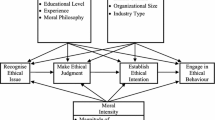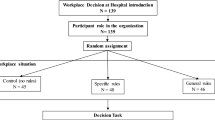Abstract
The decision making process is an important aspect of the managerial function that is becoming increasingly complex due to technological and global impacts. It is essential, therefore, to understand why various managers approach the decision making process differently. One area that is related to how managers perceive and process the information that is associated with decision making, is that of decision style.
It is not enough, however, to explore decision style in isolation, as some of the decisions that managers make often entail ethical components concerning the ability to balance the interests of diverse groups. Moral reasoning is therefore important for every manager, and could impact the decision style that is employed by such managers. The relationship between managerial decision style and moral development is one that could provide unique insights into the area of decision making, yet it is an area that has remained relatively unexplored.
Using Alan Rowe's Decision Style Inventory (DSI), in conjunction with James Rest's Defining Issues Test (DIT), the purpose of this study was to ascertain the relationship between decision style and moral development among U.S. managers.
The findings of this study of 270 managers suggest that there is a relationship between higher directive decision style scores and lower principled reasoning scores. Since the focus of individuals who demonstrate a directive decision style is on task completion, perhaps the consideration of the many alternatives that are necessary to reason at a more ethically attuned level is neglected. Managers who exhibit a directive decision style might be responsible for the management of non-managerial populations of workers, and in such a capacity, set the ethical tones and examples for employees to follow. Since training and educational interventions in the area of ethics have been shown to increase moral development scores, those managers who are identified as displaying a directive decision style might benefit from such training.
Similar content being viewed by others
References
Allinson, C. W. and J. Hayes: 1996, ‘The Cognitive Style Index: A Measure of Intuition Analysis for Organizational Research’, Journal of Management Studies, 119–135.
Davison, M. L.: 1978, ‘The Reliability and Validity of Objective Indices of Moral Development’, Psychological Measurement 2(3), 391–403
Dillman, D. A.: 1978, The Total Design Method (John Wiley and Sons, New York, NY).
Driver, M. J., K. R. Brousseau and P. L. Hunsaker: 1990, The Dynamic Decision Maker Five Styles for Executive and Business Success (Harper and Row Publishers, New York, NY).
Fleming, J. E.: 1985, ‘A Suggested Approach to Linking Decision Styles With Business Ethics’, Journal of Business Ethics 4, 137–144.
Gardner, W. L. and M. J. Martinko: 1996, ‘Using the Myers-Briggs Type Indicator to Study Managers: A Literature Review and Research Agenda’, Journal of Management 22(1), 45–83.
Gilligan, C.: 1982, In a Different Voice: Psychological Theory and Women's Development (Harvard University Press, Cambridge, MA).
Guertin, M. R.: 1986, 'Beyond a Unidimensional Theory of Moral Development: An Analysis of Jung's Personality Typology and Kohlberg's Theory of Moral Stages Comparing Career Military Officers' Wives and Civilian Women'. Unpublished doctoral dissertation, George Washington University.
Hayes, J. J. and C. W. Allinson.: 1998, ‘Cognitive Style and the Theory and Practice of Individual and Collective Learning in Organizations’, Human Relations (July), 847–862
Hellriegel, D. and J. W. Slocum Jr.: 1975, ‘Managerial Problem Solving Styles’, Business Horizons (December), 29–37.
Ivancevich, J. M., P. Lorenzi, S. J. Skinner, P. B. Crosby, M. P. Dumler and J. Kalinowski: 1994, Management Quality and Competitiveness (Irwin, Inc., Burr Ridge, IL).
Jung, C. G.: 1921, 1971, Psychological Types (Princeton University Press, Princeton, NJ).
Kohlberg, L.: 1969, ‘Stage and Sequence: The Cognitive Developmental Approach to Socialization’, in D. A. Goslin (ed.), Handbook of Socialization Theoretical Research (Rand McNally, Chicago, IL), pp. 347–480.
Kohlberg, L.: 1984, Essays on Moral Development, Volume II, The Psychology of Moral Development, the Nature and Validity of Moral Stages (Harper and Row, New York, NY).
McIntyre, R. P. and M. M. Capen: 1993, ‘A Cognitive Style Perspective on Ethical Questions’, Journal of Business Ethics(August), 629–634.
Myers, I. B.: 1962, The Myers-Briggs Type Indicator (Consulting Psychologists Press, Palo Alto, CA).
Nutt, P. C.: 1986, ‘Decision Style and Strategic Decisions of Top Executives’, Technological Forecasting and Social Change, 39–62.
Redford, J. L., R. H. McPherson, R. G. Frankiewicz and J. Gaa: 1995, ‘Intuition and Moral Development’, Journal of Psychology (January), 91–101.
Redford, J. L.: 1993, 'Psychological Type and Moral Development'. Unpublished doctoral dissertation, University of Houston, Houston, TX.
Rest, J.: 1979, Development in Judging Moral Issues (University of Minnesota Press, Minneapolis, MN).
Rest, J.: 1986, Moral Development: Advances in Research and Theory (Praeger Press, New York, NY).
Rest, J.: 1990, DIT Manual (3rd edition) (University of Minnesota, Minneapolis, MN).
Rowe, A. J. and J. D. Boulgarides: 1994, Managerial Decision Making (Prentice-Hall, Inc., Englewood Cliffs, NJ).
Rowe, A.J. and R. O. Mason: 1987, Managing With Style: A Guide to Understaning Assessing, and Improving Decision Making (Jossey-Bass Publishers, San Francisco, CA).
Rowe, A. J.: 1974, ‘The Myth of the Rational Decision Maker’, International Management (August), 38–40.
Schweiger, D. M.: 1985, ‘Measuring Managerial Cognitive Styles: On the Logical Validity of the Myers-Briggs Type Indicator’, Journal of Business Research 13, 315–328.
Taylor, L. J.: 1992, 'Moral Decisions and Psychological Type: Gender, Context, and the Myers-Briggs Type Indicator'. Unpublished doctoral dissertation, University of St. Thomas, Saint Paul.
Trevino, L. K.: 1986, ‘Ethical Decision Making in Organizations: A Person Situation Interactionist Model’, Academy of Management Review 11(3), 601–617.
Trevino, L. K. and S. A. Youngblood: 1990, ‘Bad Apples in Bad Barrels: A Causal Analysis of Ethical Decision-Making Behavior’, Journal of Applied Psychology 4, 378–383.
Weber, J.: 1991, ‘Adapting Kohlberg to Enhance the Assessment of Managers' Moral Reasoning’, Business Ethics Quarterly 1(3), 293–318.
Weber, J.: 1993, ‘Exploring the Relationship Between Personal Values and Moral Reasoning’, Human Relations 46(4), 435–463.
Author information
Authors and Affiliations
Rights and permissions
About this article
Cite this article
Pennino, C.M. Is Decision Style Related to Moral Development Among Managers in the U.S.?. Journal of Business Ethics 41, 337–347 (2002). https://doi.org/10.1023/A:1021282816140
Issue Date:
DOI: https://doi.org/10.1023/A:1021282816140




